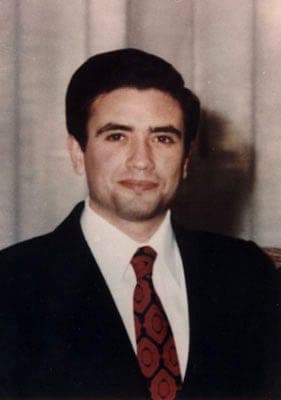ROME – Pope Francis recently overhauled the rules for Catholic sainthood, creating a new pathway to a halo called the “offer of life,” for cases in which people freely give up their lives for others. While examples theoretically could come from anywhere, a young Sicilian judge killed by the mafia in 1990 may just be a perfect fit.
A local phase for the sainthood cause of Rosario Livatino recently wrapped up in Sicily, just days after local media reported his tombstone had been defaced – a reminder in death of the same threats Livatino faced in life, for standing up to the mob’s stranglehold on local life.
Livatino was a magistrate committed to fighting criminality and corruption in the Sicilian town of Agrigento, so much so that he soon became an uncomfortable presence for the local mafia. On September 21, 1990, four men waited for the judge to leave his house to go to court, and rammed their car into his.
The 38-year-old Livatino attempted to run away in a field, but, being already wounded, his persecutors soon caught him and killed him. The strength of Livatino’s Catholic faith was such that in a speech on May 9, 1993, Pope John Paul II referred to him as “a martyr to justice and indirectly to the faith.”
The ‘kid judge,’ as he is known in Italy, is the youngest magistrate to be killed by the mafia, but he might soon become the first magistrate ever to be beatified.
In a June motu proprio, a type of Church legal document, Pope Francis opened up another path to sainthood on account of the “offer of life,” for cases in which believers “following closely in the footsteps and teachings of the Lord Jesus, freely and voluntarily offered their life for others, and persevered until death.”
This allows ‘martyrs for justice,’ such as the many judges brutally killed by the mafia like Livatino, to be considered for beatification and canonization.
RELATED: By expanding sainthood, Francis reflects new realities of anti-Christian violence
The then-Archbishop of Agrigento, Carmelo Ferraro, asked a teacher of Livatino, Ida Abate, to put together the material necessary to present a cause for his beatification. The diocesan process officially began in 2011, and is almost concluded after the testimony of the final witness at the ecclesiastical tribunal in Milan last week.
The testimony took a long time, and for months the process was stalled. Finally, the ‘investigation’ phase of the beatification procedure was concluded on July 27, and Cardinal Francesco Montenegro, Archbishop of Agrigento since 2008, will take the case directly to the Vatican.
Among the testimonies collected by the ecclesiastical tribunal of Agrigento, presided over by Father Lillo Argento, is that of a woman who claims to have been cured by an alleged miracle. But Father Giuseppe Livatino, a cousin of the judge and postulant for the canonization cause, wrote a note specifying that the process “is not yet closed.”
The material will have to be reviewed by the Sacred Congregation of Causes for Saints at the Vatican, and only then will its prefect, Italian Cardinal Angelo Amato, present the documents for final approval by the pope.
The wait might be long, considering the large number of canonization processes that could be sparked by the pope’s motu proprio.
Not everyone, however, is excited by the beatification processes of the anti-mafia martyrs. In mid-July, vandals cut off the head of the bust honoring Italian judge Giovanni Falcone, who was murdered at the hands of the mafia in 1992.
RELATED: Pope Francis encourages fight against the mafia on anniversary of brutal murders
On July 18, the day before the anniversary of the murder of anti-mafia judge Paolo Borsellino, a memorial stele of Livatino in Agrigento was effaced. A blunt object broke the stone where the dedication “to Rosario Livatino…” was etched.
The stele is erected where the ‘kid judge’ was killed. A workman discovered the damage and quickly notified the police.
Oltraggio memoria Livatino, Card.Montenegro:dobbiamo essere noi monumento vivente alla giustizia https://t.co/trHZKUHB31 @CaritasItaliana pic.twitter.com/n9RZhjZXtT
— Carmelo Petrone (@PetroneCarmelo) July 21, 2017
“This is a very serious act,” advocates for Livatino’s legacy told local media outlets. “If someone intends to scare us they are wrong. The example of Rosario Livatino will go on even if, obviously, this bothers some people.”
The procurator of Agrigento, Luigi Patronaggio, called the event “disturbing” and told the press that he would pursue any option, which “certainly cannot exclude the mafia lead.”
The cardinal of Agrigento also expressed his dismay after the act of vandalism.
“As Christians and as citizens we feel offended and pained due to the damage done to the monument in memory of the sacrifice of blood paid by Judge Livatino in 1990,” Montenegro, who is also president of Caritas Italia, told the press.
“We are aware that there are still some people and power systems that work to destroy good, to damage the dignity of many honest citizens and to prevent any development in Sicily,” he added. “To these people we repeat the appeal of John Paul II: ‘Convert, one day the judgment of God will be upon you.’”
In response to the destruction of the memorial to Livatino, the Italian Association of Certified Public Accountants, Auditors and Advisors have decided to offer an economic contribution in order to support his beatification cause.
“With the humble strength given to us by Judge Livatino,” Montenegro concluded, “I make an appeal to all: Let us try and be a living monument to justice, to good, to the respect of the laws, to love.”

















